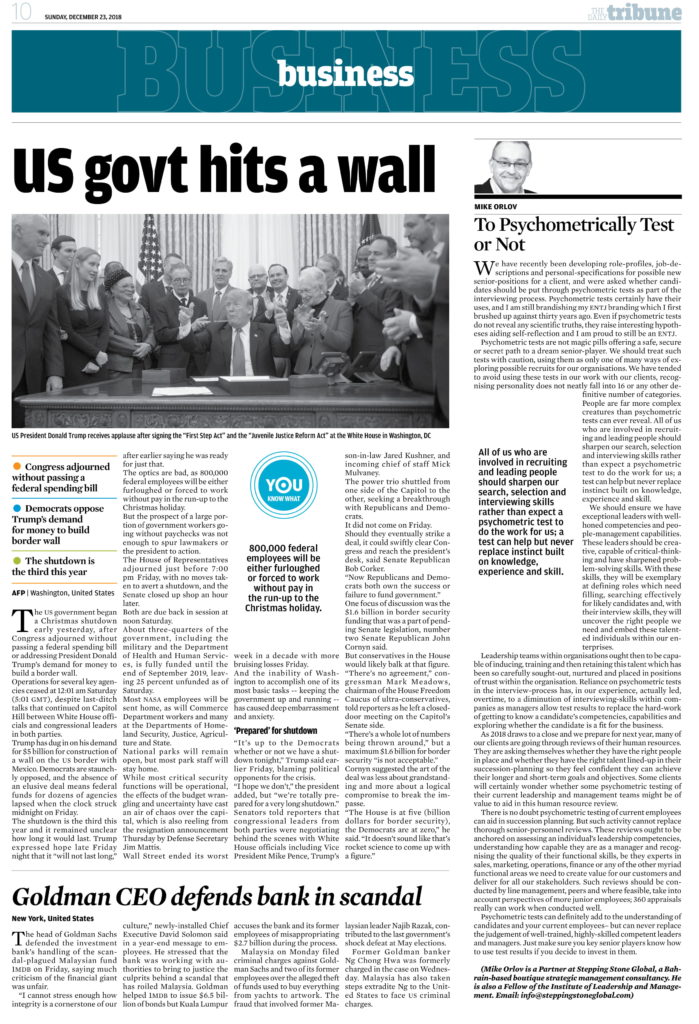To Psychometrically Test or Not
We have recently been developing role-profiles, job-descriptions and personal-specifications for possible new senior-positions for a client, and were asked whether candidates should be put through psychometric tests as part of the interviewing process. Psychometric tests certainly have their uses, and I am still brandishing my ENTJ branding which I first brushed up against thirty years ago. Even if psychometric tests do not reveal any scientific truths, they raise interesting hypotheses aiding self-reflection and I am proud to still be an ENTJ.
Psychometric tests are not magic pills offering a safe, secure or secret path to a dream senior-player. We should treat such tests with caution, using them as only one of many ways of exploring possible recruits for our organisations. We have tended to avoid using these tests in our work with our clients, recognising personality does not neatly fall into 16 or any other definitive number of categories. People are far more complex creatures than psychometric tests can ever reveal. All of us who are involved in recruiting and leading people should sharpen our search, selection and interviewing skills rather than expect a psychometric test to do the work for us; a test can help but never replace instinct built on knowledge, experience and skill.
We should ensure we have exceptional leaders with well-honed competencies and people-management capabilities. These leaders should be creative, capable of critical-thinking and have sharpened problem-solving skills. With these skills, they will be exemplary at defining roles which need filling, searching effectively for likely candidates and, with their interview skills, they will uncover the right people we need and embed these talented individuals within our enterprises.
Leadership teams within organisations ought then to be capable of inducing, training and then retaining this talent which has been so carefully sought-out, nurtured and placed in positions of trust within the organisation. Reliance on psychometric tests in the interview-process has, in our experience, actually led, overtime, to a diminution of interviewing-skills within companies as managers allow test results to replace the hard-work of getting to know a candidate’s competencies, capabilities and exploring whether the candidate is a fit for the business.
As 2018 draws to a close and we prepare for next year, many of our clients are going through reviews of their human resources. They are asking themselves whether they have the right people in place and whether they have the right talent lined-up in their succession-planning so they feel confident they can achieve their longer and short-term goals and objectives. Some clients will certainly wonder whether some psychometric testing of their current leadership and management teams might be of value to aid in this human resource review.
There is no doubt psychometric testing of current employees can aid in succession planning. But such activity cannot replace thorough senior-personnel reviews. These reviews ought to be anchored on assessing an individual’s leadership competencies, understanding how capable they are as a manager and recognising the quality of their functional skills, be they experts in sales, marketing, operations, finance or any of the other myriad functional areas we need to create value for our customers and deliver for all our stakeholders. Such reviews should be conducted by line management, peers and where feasible, take into account perspectives of more junior employees; 360 appraisals really can work when conducted well.
Psychometric tests can definitely add to the understanding of candidates and your current employees– but can never replace the judgement of well-trained, highly-skilled competent leaders and managers. Just make sure you key senior players know how to use test results if you decide to invest in them.

